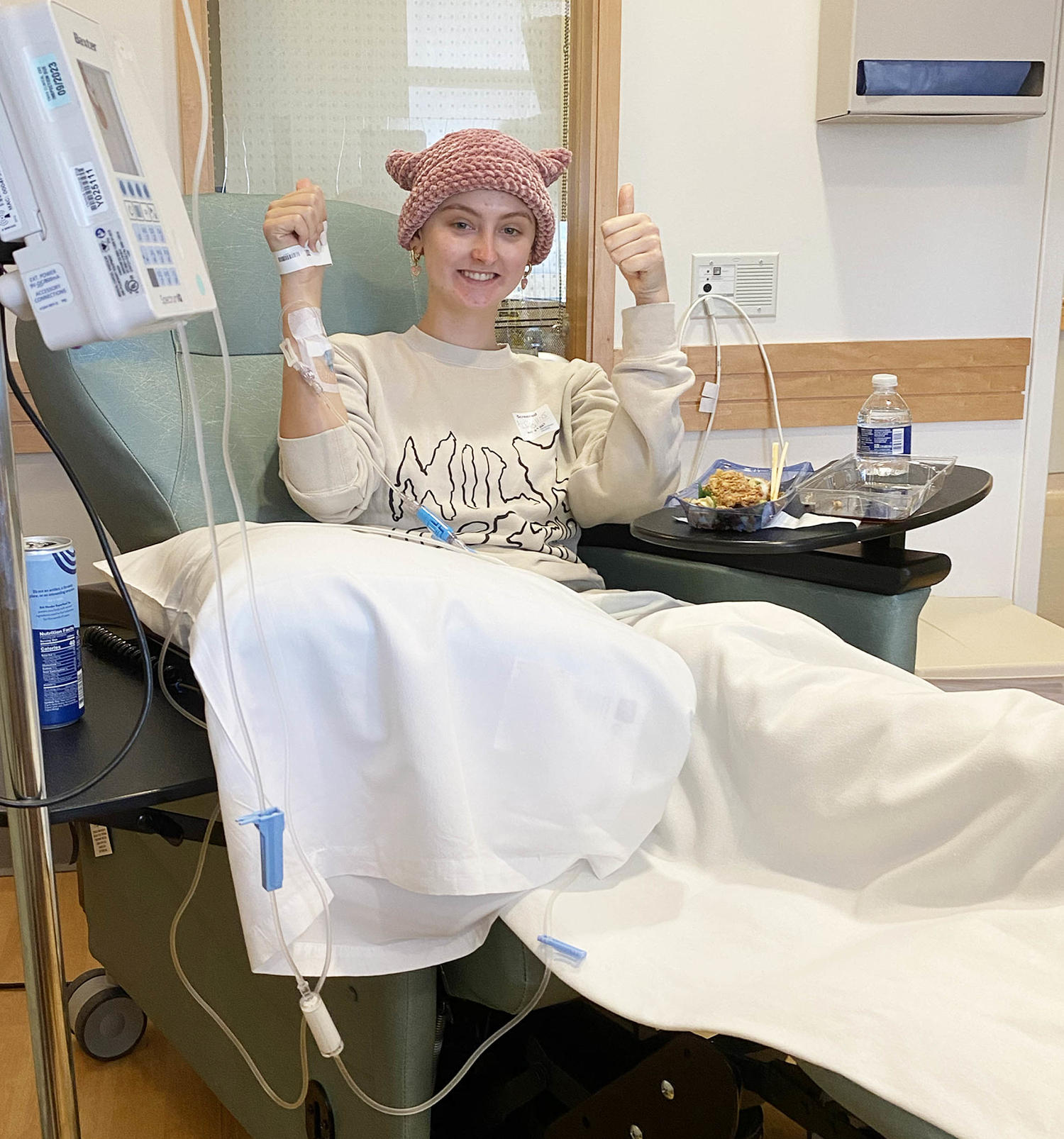As a summer camp volunteer in 2022, Molly Smith spent long days in the woods. One day, she suddenly felt tingling in her hands and feet and visited a local emergency room. Doctor thought the then 20-year-old needed to consume more fluids.
“They told me it’s probably dehydration, drink a lot of electrolytes,” Smith, 22, tells TODAY.com. “So that’s what I did.

” When she returned home in Florida and then back to school at Yale, the pins and needles did not wane. During testing and examinations, doctors eventually found an ovarian cyst and Smith was diagnosed with ovarian cancer. “(The numbness) does seem unrelated,” she says.
“It is very peculiar to all the doctors who have looked at it.” While Smith tried drinking more water, the neuropathy she felt in her hands and feet didn’t dissipate. At one point, she placed bags of ice on them to ease the prickling sensation.
“The numbness did not get any better. It honestly got much worse,” Smith says. “I was having a lot of issues like even walking long distances.
” Even when she returned to Yale the numbness continued and she wasn’t able to take dance classes or participate in dance team. The heaviness in her feet caused her to wobble, too. “I was having terrible balance,” she says.
Doctors felt unsure what caused this neurological symptoms and one suggested it was a combination of dehydration and carpal tunnel syndrome. “I thought that was pretty absurd,” Smith says. “My mom did, too, but we kept talking with them and saying, ‘No I think this is something more serious.
’” Doctors often dismissed her by explaining “some people just have neuropathy, and we just don’t know why.” “To think that one day you’re completely fine, the next day you have no feelings in your hands or it’s like pins and needles, numbness, that’s incredibly scary,” Smith says. “I wanted some answers.
” Their advocacy worked and she received a referral to a neurologist, who ordered an MRI and tested her nerves. While in the MRI, Smith developed a new symptom. “I felt a bit of pelvic pain,” she says.
“I was weirded out by it, but I felt like I should go see my gynecologist just to be safe.” Her gynecologist ordered an ultrasound, which showed a cyst. At first, doctors didn’t think it was worrisome.
“They were like, ‘It’s benign, don’t worry about it,’” Smith recalls. “We scheduled a surgery for January 2023.” Oddly, the numbness in her hands and feet stopped after they scheduled surgery.
Doctors feel puzzled by why she experienced it. “(One doctor) basically said something along the lines of there are ways that our bodies can create symptoms to show you that something’s wrong and then that symptom might go away,” Smith says. “That’s exactly what happened to me.
But there’s no way to prove that the numbness ...
was directly caused by the cancer.” After her surgery in January 2023, the biopsy revealed that Smith had dysgerminoma ovarian cancer. "It was a complete shock to me and my entire family," she says.
"Nobody in our family has had cancer this young." In her case, Smith needed to undergo additional treatment. “Usually, you only have to do surgery (for this cancer) but I actually had to do surgery and chemo because the first surgery that we did, we didn’t think it was cancer,” she says.
“That doctor was not paying attention to the fact that it could be cancerous, and they suspect that there could be surgical spill.” According to the , surgical spill occurs if the tumor ruptures during a procedure causing cancers cells to ooze into the pelvis. That’s why doctors recommended Smith undergo chemotherapy as a “preventative measure” to treat any leaked cancer cells.
Smith also underwent a second surgery where doctors removed her entire ovary and several lymph nodes to test them for cancer, too. After this procedure doctors diagnosed Smith with Stage 1 cancer. Throughout her treatment, Smith grappled with some tough choices, such as fertility preservation.
“We considered doing egg retrieval but ultimately decided against it because of how time intensive that would be and painful,” she explains. “This was incredibly difficult especially trying to think about having children. I was a sophomore in college and that wasn’t even on my mind at all and it’s brining up all these really strange conversations.
” For example, her doctor asked if she wanted to free embryos instead of eggs. “My boyfriend, we had been together for only six months at that point,” she says. “That’s just an absurd conversation to be having.
There were a lot of moments where I felt like the ...
cancer medical center was really not set up for this age group, especially the group that’s in college.” The type of cancer Smith had, dysgerminoma, is a germ cell tumor in the ovary and the most common ovarian tumor found in women between 20 and 30, according to the . “Ovarian cancer is the second most common gynecological cancer,” Dr.
Zaid Al-Wahab, a gynecological oncologist at Corewell Health in Royal Oak, Michigan, who wasn't involved in Smith's treatment, told in 2023. Like many other ovarian cancers, an ovarian dysgerminoma is asymptomatic at first, though people might notice irregular periods and bloating. Later symptoms can include ovarian torsion, when the ovary twists, or the tumor can rupture or bleed, says that National Library of Medicine.
“A lot of the time there are no symptoms and even when it’s Stage 3 or 4 the symptoms are very vague,” Al-Wahab said. While Al Wahab noted there aren’t any screening tests for ovarian cancer, doctors can detect a ovarian dysgerminoma via ultrasound and pelvic exam and its survival rate is high, 90% for 10 years, according to the National Library of Medicine. By May 2023, Smith completed treatment and has been in remission for a year and a half.
It took time for her to feel like herself again but now her “health is really good.” “Other than my chemo curls ..
. there aren’t many remnants left of what happened,” she says. Throughout treatment, she started filming her experience and sharing it on social media.
Videos included information on what she did to prevent hair loss, featured her wig shopping or showed what treatment was like. She received so many messages from other young adults with cancer. “I was overwhelmed by how many positive messages I received from other people go through similar treatments,” Smith says.
“That support led me to meet some really great friends.” That also encouraged her to start Mission Mariposa, a nonprofit for people ages 18 to 39 with cancer. The organization hosts a support group chat, provide education on social media about cancer awareness and treatment and sends care packages to young adults needing support.
“We have this community,” she says. “It’s been really beautiful to see that blossom.” Smith wants her story to encourage people to feel “empowered to advocate for themselves.
” “I hope that I can also be an example that if there is something seriously wrong, find ways to be OK,” she says. “There’s so much more to life that you can still enjoy even with a chronic illness.” Meghan Holohan is a digital health reporter for TODAY.
com and covers patient-centered stories, women’s health, disability and rare diseases..



















